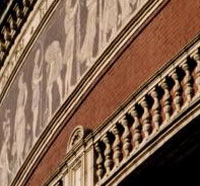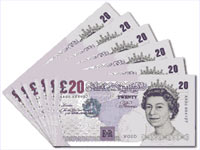The Nationals money trail - Has London been paved with gold for the bands over the years?
16-Oct-20064BR has trawled through the record books once more to bring you who has won the most money at the Nationals since 1945, and how much the competition has actually paid out. It may surprise a few of you.
 After 4BR's previous look into where the money comes from and where it goes in the rarified atmosphere of Championship banding, we thought we would put on our investigative journalist hats once more (as well as saddo anoraks) and with the National Finals looming large in the next couple of weeks, find out how the figures add up for our most high profile contest.
After 4BR's previous look into where the money comes from and where it goes in the rarified atmosphere of Championship banding, we thought we would put on our investigative journalist hats once more (as well as saddo anoraks) and with the National Finals looming large in the next couple of weeks, find out how the figures add up for our most high profile contest.
How much have the organisers over the years put up for grabs, and which bands have benefitted the most from their largesse?
The very first National Contest in 1900 saw eight cash prizes up for grabs for the competing bands. The winners took away with them the fine sum of £40, with £30 to the runners up and £20 for third. There were at this time a whole host of additional prizes that were put up as well, and in the early years bands could take home with them cash prizes for coming in the first seven places as well as additional ‘add-ons' from various sponsors such as instruments and music cases as well as those all important gold, silver and bronze medals.
The Early Years
By 1902 the top prize had been reduced in fact to £40, although the remaining prizes stayed the same, whilst the boast of the organisers was that in fact the winners would take away with them a prize fund of £1,118 for their efforts (although that did include the 1000 guinea trophy).
In fact the prize fund stayed remarkably the same up until the First World War. The cash prize for the winners remained at £40, but those all important ‘extras' meant that in 1904 Hebburn Colliery left London with the equivalent of £1,142.10 shillings in their pockets.
The following year the 10 shillings had gone missing and by 1913, even though the top seven bands still took some cash away with them, the overall value of the top prize according to the promoters had dropped to 40 cash and £1,130 overall.
With the fighting over and done with the contest returned in better financial health and by 1920 when the famous St. Hilda Colliery Band won under William Halliwell the top prize was £100 cash and the old trophy with £50 to second, £30 to thirds, £20 to fourth and £15 to fifth place. That remained the same until 1924, when only the top three bands took home cash.
In 1926, the lower prizes returned but in 1928 the first prize was reduced to £50, with £45 to second and £40 to third, £35 to fourth, £30 to fifth and £10 for sixth place.
From that year to 1937 the same prizes were awarded, but in 1938, the runners up only gained £40, £30 went to third place, £25 to fourth and £20 to fifth. Perhaps they sensed the war was coming on, as that was the last contest pay out for seven years.
Post War
The first post war contest was won by the Fairey Aviation Band conducted by Harry Mortimer and the new organizers of the National Championships decided to pay out the winners in Guineas as to make it sound a bit more grand and in fact make it more worth the bands while (The Guinea being worth a tad more than the common old Pound).
From 1945 to 1965 the winners picked up 200 guineas, whilst the runners up got 150 guineas for their trouble. Third placed bands received 75 guineas and the band coming fourth was awarded 50. There were no more additional prizes and the famous medals were also no longer seen.
With Britain recovering in austerity it appeared that there seemed no reason to up the prize money in the following years, although through the ‘You never had it so good' period of the mid 1950's and early 1960's it did seem a touch churlish why the prize money was never increased.
Major change The first major change came in 1966 when the GUS (Footwear) conducted by Stanley Boddington took the new first prize of £500, although the remaining prizes for second, third and fourth remained the same and were still paid out in guineas.
The first major change came in 1966 when the GUS (Footwear) conducted by Stanley Boddington took the new first prize of £500, although the remaining prizes for second, third and fourth remained the same and were still paid out in guineas.
That experiment was soon dropped however and the following year Black Dyke picked up just £200 for taking the title with the three lesser prizes now being paid out in pounds. The guinea was never seen again.
The advent of the World Championships scupperred any hopes of a further cash injection for the National Winners (The World Champions received £250) and it was not until 1972 and the end of that little experiment that the prize money was upped again.
Black Dyke won £500 that year with £200 going to the runners up, £100 to the third placed band and the band coming fourth gaining £75. That remained the same until 1978, when the lower sections had a cash boost, but not the Championship bands, who had to wait until 1979 for their prizes to be increased to £750 for the winners Black Dyke and with £450 to the runners up, £300 to third and £200 to fourth.
1980 to date
The biggest change of all however came in 1980 – and it is a change that remains with us to this day.
With the Bank of America Finance Ltd becoming sponsors there was a huge cash injection into all sections of the Nationals and Brighouse and Rastrick became the first winners of the new top prize of £2,000. Coming second meant £1,000, third £500 and fourth £250, and these amounts remained the same when Nat West Bank took over sponsorship the following year right up to 1985.
In 1986, Barclays sponsorship saw the dropping of the fourth prize with the top three amounts remaining the same, whilst the following year the runners up gained an extra £500 and so did the band coming third. With the exception of 1990 when a fourth place of £750 was awarded, only the top three bands have received the same prizes ever since.
It is also important to add that money loses half its real value every ten years, so the £2,000 won by Brighouse in 1980 is worth around £250 today. Is it time then for the organisers and sponsors of the National Finals to bring the prizes for the prize winners, and the winners in particular back up to date. If they did, the winners would be in line to receive around £12,000. What are the chances of that then?
1945 - 2005: The money paid out in prizes
| Year | 1st Place | 2nd Place | 3rd Place | 4th Place | Total Prizes |
| 1945 - 1965 | 200 guineas | 150 guineas | 75 guineas | 50 guineas | 475 guineas |
| 1966 | £500 | 150 guineas | 75 guineas | 50 guineas | 788 approx |
| 1967 | £200 | £150 | £75 | £50 | £475 |
| 1972 | £500 | £200 | £100 | £75 | £875 |
| 1979 | £750 | £450 | £300 | £200 | £1,700 |
| 1980 | £2,000 | £1,000 | £500 | £250 | £3,750 |
| 1986 | £2,000 | £1,000 | £500 | £3,500 | |
| 1987 | £2,000 | £1,500 | £1,000 | £4,500 | |
| 1990 | £2,000 | £1,500 | £1,000 | £750 | £5,250 |
| 1991 - 2005 | £2,000 | £1,500 | £1,000 | £4,500 |
And which band has won the most money from the Nationals over the years then?
We have gone back to 1945 to find out. We have split our fidings into three main periods of time: 1945 - 1965 when the prize fund was remarkably static and paid out in Guineas; 1966 - 1979, when there were some changes in the overall prize fund and to the winners; 1980 - 2005, from the period when the first 2,000 first prize was awarded.
These are the bands who have been the most succesful in pocketing the dosh over the years with a final overall table telling you which ones have won the most.
1945 - 1965: (All prizes in Guineas)
| 1. | Black Dyke | 1,500g |
| 2. | CWS Manchester | 1,450g |
| 3. | Fairey | 1,350g |
| 4= | Fodens | 1,325g |
| 4= | Munn and Felton (GUS) | 1,325g |
| 6. | Brighouse & Rastrick | 700g |
| 7. | Carlton Main Frickley | 375g |
| 8. | Ransome & Marles | 325g |
| 9. | Crossley Carpets | 225g |
| 10= | Hanwell | 200g |
| 10= | Cammell Laird | 200g |
1966 - 1979: (All prizes in pounds sterling*)
| 1. | Black Dyke | £3,555 |
| 2. | Brighouse & Rastrick | £1,150 |
| 3. | Cory | £1,025 |
| 4. | Grimethorpe Colliery | £900 |
| 5. | Yorkshire Imperial | £875 |
| 6. | GUS | £800 |
| 7. | CWS Manchester | £425 |
| 8= | Wingates | £300 |
| 8= | City of Birmingham | £300 |
| 10= | Besses o' th' Barn | £200 |
| 10= | Sun Life | £200 |
| 10= | City of Coventry | £200 |
| 10= | Carlton Main Frickley | £200 |
*The winning band in 1966 (GUS) was paid in pounds, with the 2nd (Black Dyke), 3rd (Fairey) and 4th (Cammell Laird) prizes in guineas. These have been converted to sterling for the table.
1980 - 2005: (All prizes in pounds sterling)
| 1. | Black Dyke | £22,500 |
| 2. | Fairey | £13,750 |
| 3= | Cory/BAYV | £11,500 |
| 3= | Desford | £11,500 |
| 5. | Fodens | £10,250 |
| 6. | Brighouse & Rastrick | £8,500 |
| 7. | YBS | £6,500 |
| 8. | Grimethorpe | £4,750 |
| 9= | CWS Glasgow/ Scottish Co-op | £4,000 |
| 9= | Tredegar | £4,000 |
| 11. | Leyland | £3,250 |
1945-65 1966-79 1980-05 Total
1945 - 2005: The 15 most financially successful bands at the Nationals
(All prize money converted to pounds sterling)
Band
1.
Black Dyke
£1,575
£3,555
£22,500
£27,630
2.
Fairey
£1,418
£154
£13,750
£15,322
3.
BAYV/Cory
£157
£1,025
£11,500
£12,682
4.
Fodens
£1,392
Nil
£10,250
£11,642
5.
Desford
Nil
Nil
£11,500
£11,500
6.
Brighouse & Rastrick
£735
£1,150
£8,500
£10,385
7.
YBS/Hammonds
Nil
£75
£6,500
£6,575
8.
Grimethorpe Colliery
£53
£900
£4,750
£5,703
9.
Scottish Co-op/CWS Glasgow
£157
Nil
£4,000
£4,157
10.
Tredegar
Nil
Nil
£4,000
£4,000
11.
Leyland
Nil
Nil
£3,250
£3,250
12.
Sun Life
Nil
£200
£2,750
£2,950
13.
GUS/Munn & Feltons
£1,392
£800
£500
£2,692
14.
Yorkshire Imperial
Nil
£875
£1,750
£2,625
15.
Ransome/ Ransome & Marles
£342
£150
£1,500
£1,992















